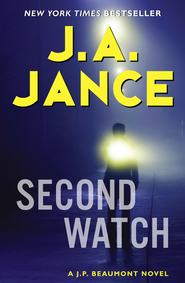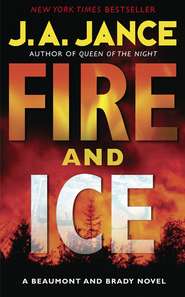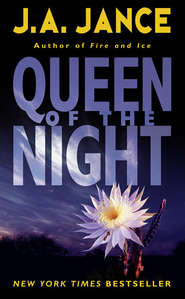По всем вопросам обращайтесь на: info@litportal.ru
(©) 2003-2024.
✖
Judgment Call
Автор
Год написания книги
2018
Настройки чтения
Размер шрифта
Высота строк
Поля
“We got her,” the county attorney gloated, pumping Bobby’s hand with congratulatory enthusiasm. “We still have the sentencing process to get through, but one way or another, Alma DeLong is going to jail, starting today. Her bail may yet be reinstated, pending an appeal, but for now she’s a guest in your establishment, Sheriff Brady. Unfortunately, the accommodations there will be somewhat better than what her victims experienced at Caring Friends.”
“Thank you, sir,” Bobby Fletcher said.
“You’re welcome, Mr. Fletcher,” Arlee replied. “I’m not sure I ever mentioned this, but back when I was a kid, I used to deliver newspapers to your folks’ place over on Black Knob. Even when times were tough, your mom always made sure I got a tip when I came around collecting. Depending on whether it was winter or summer, she also offered me either hot chocolate or iced tea. Inez Fletcher was a good woman. Sending her killer to jail is the least I can do.”
The unguarded sincerity in that statement caused Arlee Jones to move up several notches in Joanna’s estimation. She usually dismissed Jones as being a pompous ass in a mostly empty suit. Now she momentarily reconsidered that opinion. And that was the thing that Alma DeLong hadn’t realized, either. Bisbee was a small town. The invisible spiderweb of connections running from one person and one family to the next was another reason Arlee Jones had tackled this case with unaccustomed zeal.
“So are you ready to talk to some reporters?” Jones asked.
“Who, me?” Bobby asked. A look of dismay spread across his face. “Are you kidding?”
“Yes, you,” Arlee said, placing a guiding hand on Bobby’s shoulder. “And I’m not kidding. As far as the people following this trial are concerned, you’re the living face of the victims. You’re the stand-in for every family that ever made the mistake of placing a loved one in a Caring Friends facility. You and the other families did so expecting that their father or mother or grandmother would be well cared for, even though we know now that that wasn’t the case.
“Having you speak to reporters tonight serves two purposes. It shows families that they can’t just drop their loved ones off at one of these places and then not monitor what goes on once the doors slam shut. They have to be vigilant. And it also serves to show people like Alma DeLong that if they deliver inadequate care, there will be consequences. Can you do that?”
“All right,” Bobby said uncertainly. “I guess.”
Witnessing this, Joanna felt her approval needle on Arlee Jones dip back down a bit. No doubt the man would make plenty of political hay from this incident. Having Bobby standing beside him during the press conference would provide a compelling segment on the evening news, and it would probably allow him to bank any number of sound bites that would work well the next time Arlee had to stand for election.
Joanna followed the two men out onto the covered outdoor breezeway. Content to be on the sidelines for a change, she stood next to Arlee Jones and listened in while a number of reporters piled on with a bombardment of questions. To Joanna’s surprise, Bobby Fletcher answered all of them in the unassuming but straightforward manner that had made him an effective prosecution witness during the trial. He hadn’t just dropped his mother off at the facility. He had seen the quality of care going down the tubes, and his attempts to rectify the situation had come to nothing.
All Joanna had to do was listen and smile and nod. The press conference ended without her having been asked a single question. That was exactly how she liked it, and her makeup had been on straight and her hair had been combed properly. Things didn’t get any better than that.
Once the press conference was over, however, a glance at her watch told Joanna she was running late. The day-care facility closed at six, and she had exactly five minutes of grace time to pick up Dennis. After that, she would begin accumulating late fines to the tune of twenty-six dollars for every additional five-minute period. Being late was not an option.
Joanna raced out through the back door of her office, jumped into her Yukon, and headed for Dr. Millicent Ross’s veterinary office in Bisbee’s Saginaw neighborhood, calling Jenny’s cell phone as she went.
“I’m on my way,” she told her daughter. “Meet me outside. Then I’ll drop you off at the church so you can go in and sign Dennis out. If I have to mess around with finding a parking place there, we’re not going to make it on time.”
As directed, Jenny stood by the entrance to the clinic’s driveway, leaning against a gatepost with one strap of her backpack flung over her shoulder. A stiff breeze blew in out of the north, and Jenny’s long ponytail fluttered like a blond flag in the turbulent air. Back in high school, Joanna had been a tiny redhead who had often been referred to as “cute.” Jenny, on the other hand, was beautiful in a tall, slender, blue-eyed way that would never be considered cute.
It came as no surprise to Joanna that Jenny, an accomplished horsewoman, would be a natural choice for the title of Bisbee High School’s rodeo queen at some point in the course of her four years of high school. The surprise had been in the timing. Joanna had expected it to happen later on. Being rodeo queen as a senior would have been just about right, but Jenny had won the crown as a mere junior, leaving Joanna as the mother of a rodeo queen somewhat earlier than she’d thought possible.
Once she had made the mistake of mentioning all of that to her own mother. Eleanor Lathrop Winfield had responded with a singular lack of sympathy.
“It’s one of those surprises that comes with being a parent, and you don’t even have time enough to dodge out of the way,” Eleanor had told her. “Besides, you’re better off as the youngish mother of a rodeo queen than being an underage grandmother.”
The implications in her mother’s statement were quite clear, as in, your daughter’s a fifteen-year-old rodeo queen. Mine was an unmarried, pregnant seventeen-year-old. Which do you prefer?
Guilty as charged, and that was pretty much the end of Joanna’s taking issue with the rodeo queen situation.
“Hey,” Joanna said as Jenny dropped her backpack on the floorboard, scrambled into the passenger seat, and fastened her seat belt. “How are things?”
“Good,” Jenny said.
“And work?”
“Okay.”
The older Jenny got the harder it became to get her to reply to any given question with something other than a single word.
“School?” Joanna ventured.
“School was weird.”
That was more than a one-word answer. It was long on worrisome implications but short on meaning. “What do you mean, weird?”
“When the buses were leaving this afternoon, the parking lot was full of cops.”
“Really?” Joanna asked. “How come? Did something happen? Was the school on lockdown?”
And if it was, she asked herself, why didn’t I know about it?
“Ms. Highsmith is missing or something.”
Debra Highsmith, the high school principal, was someone with whom Joanna had crossed swords several times, most notably when Joanna had been invited to speak at career day and was notified that, due to the school’s strict “zero tolerance of weapons” policy, she would need to leave both her Glock and her Taser at home. Joanna had gone to the school board and had succeeded in obtaining a waiver of that policy for trained police officers.
“Ms. Highsmith is missing?” Joanna asked.
Jenny shrugged and nodded. “She wasn’t at school this morning. When I took the homeroom attendance sheets down to the office, I heard Mrs. Holder talking to Mr. Howard about it—that Ms. Highsmith hadn’t come in and that it was odd that she hadn’t called to let anyone know. After that, I didn’t hear anything else until we were going out to the buses. That’s when all the cop cars showed up.”
Wondering what had happened but not wanting to grill her daughter, Joanna changed the subject. “How was driver’s ed?”
“Mr. Forte is having a hard time finding a stick-shift vehicle for me to practice on.”
Jenny had won her local rodeo crown, but there were other titles to conquer. If she intended to run for or win any of those, both Jenny and her horse, Kiddo, needed to attend the far-flung competitions, a reality which had underscored the fact that they needed suitable horse-hauling transportation.
With that in mind, Butch had gone on Craigslist and found a bargain-basement used dual-cab Toyota Tundra pickup complete with a heavy-duty towing package. It was a good enough deal that he had snapped it up on the spot. The only sticking point had to do with the fact that the Tundra came with a manual transmission, and all the vehicles used for Bisbee High School’s driver’s ed classes were automatics.
“If Butch finishes going over his copyediting, maybe he can take you out for a spin tomorrow since you don’t have school.”
“I’m working tomorrow,” Jenny said. “We’re planning to do the driving thing on Saturday.”
Faced with severe budget shortfalls, the school district had switched to four-day weeks, leaving the schools shuttered on Fridays and weekends. It cut down on utilities and transportation costs, but it left working parents scrambling for something to do with their kids each Friday when school was out and the parents still had to work. Joanna was fortunate. On those days when extra kids had to be accommodated at the church-run preschool and day care, Dennis was usually able to be at home with Butch. When Butch wasn’t available, they could call on Carol Sunderson, their part-time housekeeper, and her two grandsons.
Joanna pulled over to the curb, and Jenny dashed inside to get her brother. While she was gone, Joanna called Alvin Bernard, Bisbee’s chief of police. She was still on hold when Jenny came out with Dennis in tow. As Jenny strapped her little brother into the car seat that was a permanent fixture in Joanna’s patrol car, Alvin finally came on the line.
“Sorry to make you wait so long,” Alvin said. “I’m busier than a one-legged man at a butt-kicking contest.”
Like Arlee Jones, Alvin Bernard was a good old boy of a certain vintage. When Joanna was first elected sheriff, Alvin hadn’t exactly welcomed her to the local law enforcement community with open arms. Over time, however, they had buried the hatchet and learned to work together.
“What’s the deal with Debra Highsmith?” Joanna asked.
“Sorry, I suppose I should have given you a call about this,” Alvin said, “but it’s been crazy. When she didn’t show up at school this morning and didn’t call in, we sent out officers to do a welfare check. They found nothing—zip. Her purse was there, but her cell phone, car keys, and car are missing. And there’s a pair of shoes on the floor beside the door, as though she kicked them off as soon as she came inside. There was no sign of forced entry. No sign of a struggle. It’s as though she went home after school yesterday afternoon and then both she and her vehicle simply vanished into thin air. We’ve checked with all the neighbors. No one admits to having seen or heard anything out of the ordinary with her or with her dog.”
“She’s got a dog?” Joanna asked.
“A big Doberman,” Alvin replied. “The neighbors tell us she’s only had him a couple of weeks, but he’s gone, too. Dog dishes and doggy doo-doo are everywhere. No dog, but with the car and keys gone, it’s unlikely that the woman’s on foot, and chances are the dog is with her. All the same, we’re searching the neighborhood in case she went out for a walk with the dog. It could be she suffered some kind of medical emergency and ended up in a ditch where no one can see her. Or else she’s in a hospital. I’ve got someone calling hospitals in the area just in case.”









